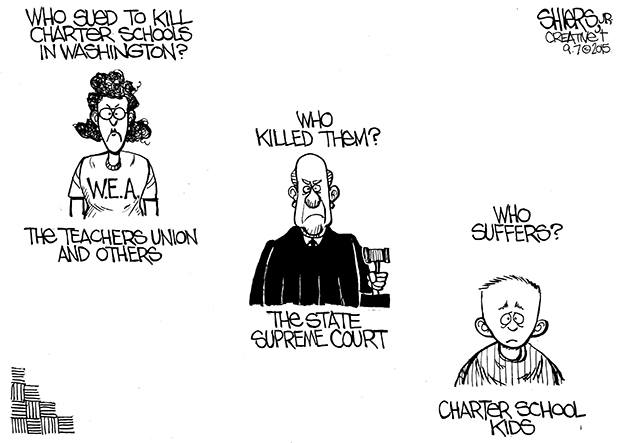On Sept. 4, the state Supreme Court derailed Washington’s nascent charter school movement when it ruled that charter school Initiative 1240 is unconstitutional.
Approved by voters in 2012, I-1240 allowed up to 40 charter schools at a rate of eight per year. The initiative specified that low-income, at-risk students be given priority and charter schools were required to meet the same rigorous certification, performance and teacher accreditation standards as traditional schools.
Nevertheless, the state teachers’ union sued to overturn the initiative and in a 6-3 decision, the Supreme Court agreed.
What happens next? No one knows at this point what will happen to the students enrolled in the nine charter schools already in operation. Voters approved I-1240 because they wanted a choice, an alternative to our state’s traditional public schools.
Now that choice is gone.
That is unfortunate, because charter schools are a proven success. Ironically, the best evidence of that came in the wake of one of our nation’s worst natural disasters.
In 2005, Hurricane Katrina devastated the Gulf Coast, flooding cities and towns in four states and killing more than 1,800 people. The government response, especially by FEMA (Federal Emergency Management Agency), became the poster child for an inept and incompetent bureaucracy.
But out of this disaster has come a story of success. The hurricane gave New Orleans educators the opportunity to reinvent the city’s failing public schools.
Two years before the storm struck, the state had created the Louisiana Recovery School District (RSD) to turn around a school system that was riddled with corruption and teetering on the brink of bankruptcy. Nearly 75 percent of eighth-graders could not meet the basic reading standard and 70 percent scored below the basic math standard. The New Orleans public school system was the lowest performing district in Louisiana and Louisiana was the second-lowest performing state in the nation.
When Hurricane Katrina struck, the RSD controlled only five of the state’s 128 failing schools. The massive storm was a game changer, opening the way to a vast expansion of charter schools. By the start of the 2014 school year, all of the RSD schools in New Orleans were charter schools and nine out of 10 of the city’s students were in charter schools.
According to the Christian Science Monitor, test scores and graduation rates have climbed steadily in New Orleans. And while there are fewer public school students than before the storm – 43,000, down from 65,000 – the demographics are similar: 90 percent African-American (compared with 94 percent pre-Katrina) and 82 percent low-income (up from 77 percent).
Not all of RSD’s charter schools were successful. RSD shut down or did not renew the contracts of six charter schools that failed to meet standards, proving that low performing charter schools are dealt with swiftly.
Charter schools are independent public schools that are free to be more innovative but are held strictly accountable for improved student achievement. Charter schools let parents “vote with their feet,” creating a market-based approach that promotes competition among public schools pushing them to improve.
Nationwide, only about 5 percent of public school students attend charter schools. But in Detroit, 51 percent attended charters in 2012-13, and in Washington, D.C., 43 percent, reports the National Alliance for Public Charter Schools. Another four cities topped 30 percent.
Memphis and Nashville, Tennessee are replicating some of New Orleans’ approaches to turn around their lowest-performing schools and Missouri’s board of education is considering a New Orleans-style takeover of the troubled Kansas City schools.
The state Supreme Court ruling means that, for now, Washington parents cannot choose charter public schools. Hopefully, supporters will be able to offer them that choice again soon.
Don C. Brunell is a business analyst, writer and columnist. He retired as president of the Association of Washington Business, the state’s oldest and largest business organization, and now lives in Vancouver. He can be contacted at theBrunells@msn.com.


